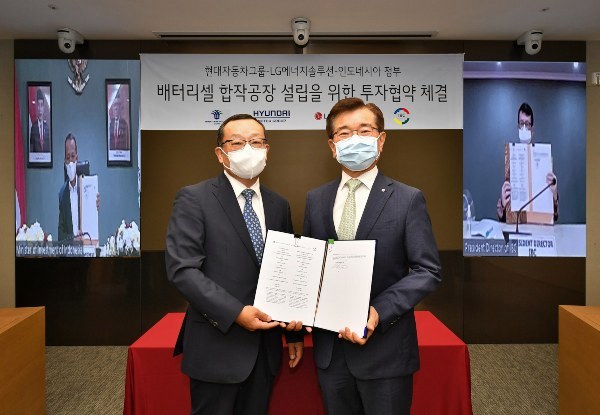As electric vehicles become more prevalent, the demand for batteries will rise. Hyundai Motor Group is making moves to prevent having to scramble around for a steady supply by teaming up with LG Energy Solution. The two companies signed an MOU with Indonesia to set up a joint venture (JV) to make battery cells for vehicles.
Both companies have agreed to invest up to $1.1 billion in a plant located in Karawang, Indonesia, with ownership stakes at 50-50. The government of Indonesia will offer incentives and other packages to help the plant go into operation. In a statement, Bahlil Lahadalia, Indonesia’s investment minister and head of the country’s Investment Coordinating Board, said, “This matter is of special interest to the government at this moment. We will oversee this battery cell investment from start to finish.”
The two companies have a decade-long history of working together on battery solutions.Construction on the plant is scheduled to start in 2021 Q4 and be concluded by 2023. The first batch of mass-produced batteries is expected in the first half of 2024.

The Karawang site covers 330,000 square meters. The completed plant will produce 10 GWh worth of lithium-ion batteries every year, enough to power 150,000 electric vehicles. Hyundai will share the batteries with Kia, with both carmakers using Hyundai’s Electric-Global Modular Platform (E-GMP). The battery cells will be optimized for the EV platform to give the highest efficiency and performance.
Hyundai and LG Energy Solution settled for Indonesia because it is among the largest nickel producers in the world, a crucial raw material in battery production. The government of Indonesia is also pursuing its goal of stimulating an ecosystem that will support the growth of a local EV industry. The JV was attracted to Karawang due to its strategic location, well-established road networks, airports, and ports. The city is already a hub for many companies in the automotive, electronics, logistics, and construction materials industries.
With plans to sell more than a million EVs annually, and more than 23 EV models in the pipeline, Hyundai needs all the battery cells it can get. Hyundai and its affiliate, Kia, together occupy the position of the fifth-largest automaker.